WASHINGTON — President Donald Trump’s decision to include possible U.S. troop moves as part of his summit with North Korean leader Kim Jong Un drew concerns from some Republican lawmakers on Tuesday and condemnation from numerous Democratic critics.
In a press conference Tuesday following the hours-long summit in Singapore, Trump said that it would be “inappropriate to be having war games” while U.S. and North Korean officials work out agreements “to build a lasting and stable peace regime on the Korean Peninsula.”
He also noted that the United States has thousands of service members stationed in South Korea that “I would like to be able to bring them back home” but said those troops withdrawals aren’t part of negotiations right now.
Officials from the Pentagon and the South Korean military have said they would review Trump’s remarks but have made no moves yet to cancel any joint exercises.
RELATED

Members of his own party said they would give the commander in chief latitude on the issue of suspending military exercises but provide much harsher scrutiny on any military personnel drawdowns in the region.
“No moving troops,” said Sen. Joni Ernst, R-Iowa, and a member of the Senate Armed Services Committee. “As far as moving troops off the Korean Peninsula, we need to stay there. We don’t just move our troops, no.”
Fellow committee member Lindsey Graham echoed that sentiment in an appearance on “CBS This Morning.”
“I don’t mind putting these exercises on hold. Over the arc of time, the exercises won’t matter,” he said. “But the one thing I would object to violently is withdrawing our forces from South Korea.
“China is trying to play president Trump through North Korea. China’s goal for decades is to drive us out of Asia. If we withdraw our forces, and that’s part of a deal, I can’t support the deal.”
House Seapower Subcommittee Chairman Rep. Rob Wittman, R-Va., favored conducting the exercises but understood suspending them as a goodwill gesture — since they can be reinstated if talks collapse or Kim cheats on any future deal. But troop withdrawals were more sensitive.
“I don’t want any troop drawdown unless there is a repeatedly verifiably and irreversible denuclearization. Period,” Wittman said, adding: “I understand backing off the exercises, but I don’t think if you’re going to be effective in this — in keeping North Korea’s feet to the fire — that you can in any way shape or form pull back any of our presence in the region.”
In a roundtable with reporters on Tuesday morning, Sen. David Perdue, R-Ga., said the change in exercises or troop deployments “hadn’t been in any of the conversations I had been in” leading up to the summit. He called their inclusion troubling.
“But the idea that the president has said this is might be on the table doesn’t mean it’s a signed agreement,” he said. “So I don’t believe it’s a negotiating tenet yet.”
But other Republicans said they were less alarmed by the promises surrounding U.S. military forces. Sen. Tom Cotton, R-Ark., said Trump still has months before the next major exercise with South Korea to decide whether Kim Jong Un is living up to his promises.
“I believe that Donald Trump is going to continue the campaign of maximum pressure, and he will not grant one-sided unilateral concessions,” he said.
Sen. John Cornyn, R-Texas, and the chamber’s No. 2 leader, called the president’s opening offer “surprising,” but also “a demonstration of good faith in the interest to keep the conversation going,” adding “I’m not too concerned about the process by which we get there.”
“The way I look at it is if you’re talking, you’re not fighting, and we need to avoid a military conflict if we can,” Cornyn said. “A lot of innocent people would die in the process.”
Democrats were more skeptical. Sen. Dick Durbin, the Senate’s No. 2 Democrat and ranking member of the Appropriations Defense Subcommittee, chastised Trump for calling the he exercises as “provocative” and said he hoped Seoul was consulted on the decision. It was unclear to him whether troop withdrawals are really in play.
“We have 28,000 uniformed and another 100,000-plus civilian on the South Korean Peninsula, and before we start moving them, we should be careful of their safety an the safety of South Korea,” Durbin, D-Ill., told reporters.
Sen. Richard Blumenthal, D-Conn., called the joint military exercises “serious and significant” in projecting U.S. power in the region.
“Cancelling them is a troubling step, especially without any real advances towards denuclearization,” he said. “I want to know from the Pentagon what this step means in practical terms, and whether it possibly compromises our national security.”
Sen. Patrick Leahy, D-Vt., said he was troubled that “the president has agreed to unilaterally halt military exercises with South Korea without verifiable commitments from North Korea to denuclearize.” Senate Armed Services Committee ranking member Jack Reed, D-R.I., said that the United States “must ensure that our alliances with South Korea and Japan do not suffer during this process.”
Both Republicans and Democrats in the Senate said they expect to be heavily involved in the negotiation process moving forward.
Joe Gould was the senior Pentagon reporter for Defense News, covering the intersection of national security policy, politics and the defense industry. He had previously served as Congress reporter.
Leo covers Congress, Veterans Affairs and the White House for Military Times. He has covered Washington, D.C. since 2004, focusing on military personnel and veterans policies. His work has earned numerous honors, including a 2009 Polk award, a 2010 National Headliner Award, the IAVA Leadership in Journalism award and the VFW News Media award.




